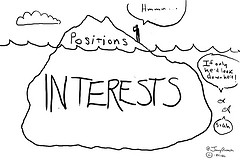
As I have written about before on the blog, I am always keen on learning more about the field of volunteer management. For the moment I am a keen volunteer and very appreciative of the respectful way I am treated as a volunteer.
Realizing that the strategies to supervise volunteers are a bit different than those for supervising paid employees, I was pleased to get connected to Dan Dubeau earlier this year to talk about the skills to manage volunteers.
Dan is the Program Manager for the Community Cup Program at the Catholic Centre for Immigrants. For over 10 years, Dan has been dedicated to helping newcomers integrate and settle into Ottawa. Dan is also the chair of the Ottawa Administrators for Volunteer Resources (OAVR) and believes strongly that a good volunteer experience can open up many doors for individuals and the community.
He generously agreed to be interviewed for the blog.
The interview appears in multiple parts. The first part is about Dan’s affiliation with the OAVR.
What is the Ottawa Administrators for Volunteer Resources (OAVR)?
The mandate of the group is to:
- To promote professionalism in volunteer resources management
- To support our members in the pursuit of their goals as managers of volunteers
- To provide a forum to share information and resources
- To network with peers
Who can join the organization?
- Individuals whose work (paid or unpaid) includes managing/coordinating volunteer resources
- Managers/coordinators of volunteer resources not currently working in the field
- Students in a degree or certificate program in management of volunteer resources
Why should mangers of volunteers join the OAVR?
First, the membership fee is modest – only $30 a year – for the benefits that you get from membership. Members can network and participate in professional development. Prospective members should also know that there is a bursary available to further professional development or research related to volunteer management or volunteerism.
The group functions as a community of practice which is great as the professional recognition of the profession increases. We can discuss thorny issues such as the difficult matter of asking a volunteer to discontinue their involvement in an organization.
There is also definite strength in numbers – for instance, we were able to lobby the Ottawa Police to invest in bringing down the processing wait times for police checks for the vulnerable sectors.
What are some recent developments of interest to Managers of volunteer resources?
In 2012, the National Occupational Standards for Managers of Volunteer Resources were published by the HR council for the Non-profit sector.
These standards show that this specialization has grown into more of a profession in the past decade. The standards list out the main task categories and the expected tasks for each. These range from developing volunteer services and recruitment to maintaining records, managing performance and recognizing contribution. They also include the need for volunteer managers to look after their own professional development.
With your work in the OAVR coming to a close, what would you consider your accomplishments over the past few years?
I’ve worked to promote the existence of the network and to grow the membership. We’ve expanded the range of volunteer managers involved in the group including making stronger links to sports-related areas. I’ve also supported the group to expand the use of technology and social media.






